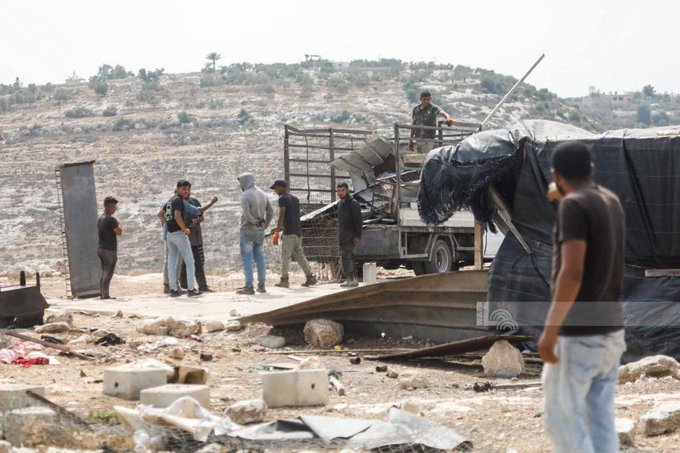3 communities in Bethlehem, Ramallah, and Jericho under attack
BETHLEHEM
On August 2, settler militias set up a new outpost near the village of Kisan in the southern West Bank province of Bethlehem. This marks the establishment of the eighth outpost by Israeli settlers in the Deir Alla area, adjacent to the Palestinian community known as Wadi Ebyan, over the last two months.
Kisan and its surrounding areas continue to face repeated attacks by Israeli colonists. The spread of outposts has created a tightening ring around the village, restricting the movement of residents and threatening their livelihoods and safety.
In an organized raid, Israeli settlers set up new tents in the targeted area and then launched a direct attack on the homes of 15 Palestinian families living in the Wadi Ubayyan community. Settler attacks included the theft of private property, most notably solar panels and metal panels used for fencing the families living ground. Furniture and other contents of homes were also deliberately destroyed and vandalized. This attack was preceded by a direct threat to force the residents to leave the area voluntarily, reflecting a planned policy of intimidation and forced displacement.
WATER AS A TOOL OF DISPLACEMENT
On July 24, settlers destroyed the water network supplying the community and blocked the only access road connecting the community to Kisan village, leaving the 17 families without access to water or basic services.
In February this year, a settler destroyed the drinking water network in the Deir Alla area in the Tekoa Desert, in the village of Kisan, which serves 15 families.
RAMALLAH
On Tuesday, August 13, the Jahalin Bedouin community in Deir Ammar, west of Ramallah in the central occupied West Bank, was displaced following escalating settler violence. This forced eviction came after several days of ongoing attacks, starting on August 9, prompting families to move their livestock and evacuate women and children for safety.
The displacement scattered 19 Bedouin families—about 130 people. Some attempted to stay nearby in Deir Ammar to maintain their traditional livestock-based lifestyle, while others were forced to seek shelter in rented homes in surrounding villages.
Around 15 days before the displacement, settlers erected a new outpost on the hill, installing tents and raising an Israeli flag. Since then, violent incidents intensified, including a fire set by settlers in a tent on the edge of the community that burned overnight due to the lack of accessible roads for emergency help.
Over the past month, settlers began constructing a road around a nearby hill, sparking a campaign of harassment. This included physical assaults, road closures, water supply cuts, and preventing grazing, which devastated the community’s ability to survive. The new settlement road cuts the village off from nearly 3,000 dunams of land—half its territory. While formal eviction efforts have failed in the past due to popular resistance, Israel appears to be shifting tactics by allowing settler outposts to carry out forced displacements. Many Jahalin Bedouins are originally refugees from the 1948 Nakba and are recognized as indigenous to the Negev and East Jerusalem by the UN.
JERICHO
During late June 2025, attacks had escalated. Settlers raided homes, released livestock to destroy crops, and stole sheep. Six illegal settlement outposts were established near Bedouin homes, pushing residents closer to forced displacement.
On July 3 and 4, over 50 Bedouin families were forcibly displaced from Arab Al-Mleihat after threats and attacks. Settlers celebrated the expulsions and expanded their presence with new tents, under army protection.
Many displaced families attempted to return by the end of July, but were quickly met with renewed violence. Settlers attacked returnees, while Israeli forces blocked aid and seized construction materials to prevent rebuilding.
Just one day later, on August 1, settlers burned six homes, forcing 20 families to flee again. These events reflect a broader, systematic campaign to expel Palestinian Bedouins from the Jordan Valley through violence and fear.

